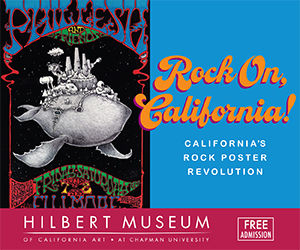The Anaheim Poetry Review Practices Hope and Remains Human
- Abigail Stephens

- Nov 20, 2025
- 5 min read
The Anaheim Poetry Review and Poet Laureate Camille Hernandez aim to unify storytellers under a language of shared experience and a discipline of hope.

As ICE raids ramp up and rallies take to the streets outside, inside public libraries and brewery book clubs, Anaheim’s literary community comes together to compose its third citywide poetry compilation. These opposing events have everything to do with each other. The volume’s curator, Anaheim Poet Laureate Camille Hernandez, believes that the poetry review is an avenue to reclaim and repurpose the first weapon used in any act of persecution or political violence: a command of language.
“The role of the poet is to mess with language, because, as we've seen politically, language is used to dehumanize, language is used to separate, and language is used to harm,” Hernandez says. “So, there's so much resistance in poetry, because what we're saying is ‘I am using these tools that you've used to objectify and dehumanize me, to not only make myself human, but to also give glory to my own community.’”
Hernandez is a writer, theologian and poet by trade, trained in community development and pastoral care. Her writing explores the concepts of intimacy, resistance and the care-based leadership of grandmothers, mothers and marginalized women. However, none of Hernandez’s own work features in the upcoming poetry compilation. As a lifelong Anaheim resident, Hernandez believes it’s integral that her first publication as poet laureate uplifts Anaheim’s diverse cultural character, before publicizing her own poems.
The third volume of Anaheim Poetry Review (APR) launches Nov. 22 at Radiant Beer Company, where attendees will hear select readings from APR’s expansive collection of authors, spanning cultures, generations and immigration statuses. The event aims to be exceptionally inclusive, acknowledging the multifaceted humans occupying each and every corner of Anaheim's creative community. Hernandez finds that, throughout each narrative, feelings of hope run through the issue like a unifying thread.

“In order for humanity to persist, there has to be some sort of discipline of hope,” she says. “And so the through line (of the Anaheim Poetry Review) is that this is very hopeful, despite all the reality, all the harshness, all the terribleness. The discipline of hope is that you keep writing and you keep sharing your story .… Those are hopeful acts.”
APR was established in 2022 by Winnie Van Camp, the previous poet laureate – a city appointed position meant to locate representatives of Anaheim’s unique creative character. Van Camp was one of the first regulars at the Anaheim Central Open Mic, an event organized by Anaheim’s inaugural Poet Laureate Grant Hier. After receiving Hier’s title, Van Camp wanted to use her experience as editor for the speculative poetry review "Eccentric Orbits” to establish a poetry compilation where her fellow open mic night attendees could gain confidence in themselves as budding poets.
“The experience of having their first poems published gave many of our writers the boost to go forward into the poetry community,” Van Camp says. “Over the two years I served, I watched many of our poets go from that first publication in APR to publishing in more journals and even launching their first poetry books. Many love to go to the library and see their work on the library shelves. For those who have not been published before, it is a special thing.”
During her time as poet laureate, Van Camp had nominated Hernandez’s contributions to APR for the Pushcart Prize Literary Awards. While this is Hernandez’s first time working as an editor, Van Camp feels that she is a good judge of a poem’s quality and has shown stylistic expertise in her own work. In fact, she, along with many of APR’s previous poets, came back to submit poetry to the third volume.
Determining which 40 poems out of 138 submitted would be included, Hernandez looked not just at mastery of craft and approach to story, but the power to convey strong emotions, often too elusive to place on paper.
“A poem that grieves has to bring you to your knees. I want to find the person who has the words that brings us there,” Hernandez says. “A poem that tells the truth has to be visceral. I'm always thinking of how much the story speaks to the human experience.”
It is a difficult task to cover all aspects of the diverse human experience, but Hernandez endeavors to represent all demographics of Anaheim, specifically ensuring that the volume is multi-generational, featuring both 12-year-old poets and senior citizens.
Hernandez holds a particularly strong bond with the younger poets. After graduating with a community studies degree from UC Santa Cruz in 2010, Hernandez returned to writing. She claims to owe that decision to a citywide competition she won at the age of 7 through the La Palma Public Library. There, Hernandez discovered the importance of not only affirming young writers’ talents, but reminding them that their stories are worth telling.
“Publishing youth is very, very important to me because if that didn't happen to me, I don't think I'd be on this trajectory that I'm on now,” Hernandez says. “I can publish whatever I want. I can write books and books and books, and that's great, but that is not a heritage. A heritage is built off investing in the next generation, and believing in what they have to offer, saying, ‘Hey, I see your story, and I want you to know that it's important enough for other people to see too.’”
Hernandez finds herself worrying that intergenerational support in publishing could become a lost art, but her faith in the Anaheim poetry community is reaffirmed by its impressive levels of solidarity, which have only increased over her first term as poet laureate.
In February, Hernandez hosted the Black Literary Salon, which asked Black poets to read their works and engage in roundtable discussion with the community. Despite expecting only five to 10 attendees, the event attracted an audience of 50, with multiple attendees asking Hernandez and her fellow literary leaders to provide more events for the Anaheim poetry community to share stories face-to-face.
“I think the benefit of Anaheim is that there seem to be so many places where poetry thrives and exists in its own little ecosystem and pocket within the city,” Hernandez says. “At the Black Literary Salon, I was grateful for the affirmation that people want poetry. Poetry is a conduit for community, and what we need right now is community – accessible, personable community.”
Hernandez hopes to fulfill requests for more literary events through the APR launch on Nov. 22. Attendees will hear poets read their contributions to APR and one poem that was not published within the collection, as well as enjoy food from Radiant Beer Company and listen to introductions and closing remarks by Hernandez. At this last event of the calendar year, she is looking to celebrate the unrelenting creativity of poets, despite the difficult year, and their dedication to quilting words into resistance.
“Poetry has literally changed lives, and for that reason alone, (the launch) is good enough to come to, right? (Poets) have learned to blend, mix, bend, change and reshape language. When you go to an event like this, or any poetry event, what you're really doing is watching people reclaim humanity through words. That kind of alchemy is rare and so valuable.”
Anaheim Poetry Review Launch Party
Where: Radiant Beer Company, 1566 W Lincoln Ave, Anaheim
When: Noon, Nov. 22
Cost: Free
Contact: Tickets Available Through EventBrite
















